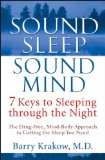Needing Good Sleep
Do Older Persons Need More Sleep?
Gretchen Heuring | ElderThink | 03.08.09
It may seem like older people need more sleep since we often nap in the daytime and retire early. Actually, many (perhaps most) of us are sleep-deprived.
Researchers tell us that older people have more trouble sleeping for long periods and are wakened by various kinds of pain, pressure on the bladder, hormone fluctuations, and body temperature. The idea is that older adults are unable to sleep for long periods and so must compensate with naps, making it seem like we need more sleep.
The effect of shorter periods of sleep is the same for old folks as it is for everyone else. We are often irritable, depressed, and suffer from something called "cognitive impairment" which actually means dull-witted. Besides that, we heal more slowly since the body does most of it's healing while asleep.
Six Tips for going to sleep and staying that way:
ONE Make your bed. A comfortable bed will help you sleep well. Smooth sheets and soft pillows feel good.
TWO Stay warm and snuggly. Our body temperatures drop when we are sleeping. The skin thins as we grow older and we feel cold more keenly. We may not realize we are cold when we wake in the middle of the night, but the availability of another blanket might be just to ticket to dropping off soundly once again.
THREE Keep it dark. We need darkness to sleep well. Light sends signals to our bodies that we should be awake.
FOUR Have a bedtime. If you practice going to sleep at the same time every night, you will be responding to your body's natural rhythms and you will sleep better and better.
FIVE Drink milk instead of alcohol. Alcohol might make you sleepy but it prevents you from sleeping well. Milk, on the other hand, has properties that help you get a restful sleep.
SIX Count blessings. Think about moments of joy, peace and harmony. Relive them freely. They our ours, after all.
Getting Up in the Middle of the Night
As we get older, it is common to get up once or twice in the night for various reasons. The University of Maryland Sleep Disorders Center recommends the following course of action after getting up in the night:
If you cannot get back to sleep within 15-20 minutes, get up. Get out of bed. Leave the bedroom. Read, have a light snack, or take a bath. Avoid television, or any challenging activity. You will know when you are ready for sleep again.
It's important to note that if our bodies are well and we are treating them properly, we will fall asleep fairly quickly, sleep comfortably, and feel rested in the morning. Even if we need to get up in the night, we will return easily to quality sleep.









